Prof C Durga Rao answers concerns regarding coronavirus third wave
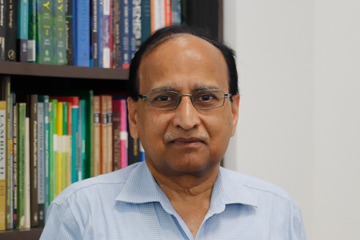 Eenadu newspaper has published an informative interview with Prof C Durga Rao, Professor of Biological Sciences & Associate Dean, School of Engineering and Sciences, and School of Liberal Arts and Social Science (SLASS), in their front page on the most relevant topic of our times, ‘Corona Virus and its Mutations’. As the world stays petrified awaiting further mutations of Covid-19 virus, Dr Rao clearly answered the pertinent questions regarding the waves of pandemic in this exclusive interview.
Eenadu newspaper has published an informative interview with Prof C Durga Rao, Professor of Biological Sciences & Associate Dean, School of Engineering and Sciences, and School of Liberal Arts and Social Science (SLASS), in their front page on the most relevant topic of our times, ‘Corona Virus and its Mutations’. As the world stays petrified awaiting further mutations of Covid-19 virus, Dr Rao clearly answered the pertinent questions regarding the waves of pandemic in this exclusive interview.
Detailing from the process of cell division to the natural process of origin of mutations, he talked about the harmless viruses and the pathogenic viruses that influence the immune system of the human body. Moving on to the antiviral medication, he cautioned against Remdesivir, a drug widely used for Covid-19 treatment. Majority of antiviral drugs are similar to the nucleotides in viral RNA, and are called analogues. As the virus keeps an mutating naturally because of the error-prone viral RNA polymerase that synthesizes progeny viral RNA copies, when a drug is frequently given to a patient, mutants that are resistant to the drug will be selected to replicate in the presence of the drug. Thus, when the same drug is given to treat the new mutant that escapes, the drug will not work against the new variants.
The single mutations L452R and E484Q, first detected in variants in the US and South Africa, respectively, occurred simultaneously in the double mutant, first detected in India. There is nothing surprising in finding double mutants as a variety of mutants are produced in a single patient, but only a few, which are capable of faster replication and spread will be able to survive in the population. As we have a large population density, the double mutant, which binds to the ACE2 receptor on the cell surface and enters into the cell more efficiently, spread like wildfire from December last year to March this year. To face the potential threat of the third wave of Covid-19 virus that is looming around us, the people have to take necessary precautions and comply with the lockdowns and restrictions. Though a third wave is inevitable, it is possible for India to avoid the severe impact of the third wave through wearing a mask, and immunization, he said. Approval of more vaccines and enhancing the delivery of vaccines across the country can shield the population from severe coronavirus disease and death.
Dr Rao, whose major research areas include Molecular Virology, Recombinant DNA technology, Vaccines and Diagnostics had been a professor and INSA Senior Scientist at Indian Institute of Science (IISc). He is currently working on a project worth 1.10 crore.
- Published in Biology News, News
Formulation of new designs and processing parameters for continuous hydrogen production
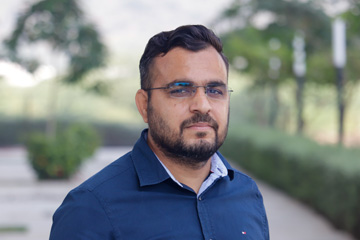 Dr Lakhveer Singh, Assistant Professor in the Department of Environmental Science, SRM University-AP, sets forth advanced avenues of scientific research on maintaining high current densities which is a key challenge in scaling-up microbial electrolysis cell (MEC) reactors.
Dr Lakhveer Singh, Assistant Professor in the Department of Environmental Science, SRM University-AP, sets forth advanced avenues of scientific research on maintaining high current densities which is a key challenge in scaling-up microbial electrolysis cell (MEC) reactors.
“Scaling-up Up-flow Microbial Electrolysis Cells with a Compact Electrode Configuration for Continuous Hydrogen Production”, published in the Bioresource Technology journal is about a novel 10 L microbial electrolysis cell (MEC) reactor with a total electrode surface area greater than 1 m2 was designed and evaluated for hydrogen production. Performances of the reactor suggest that the longitudinal structure with the parallel vertical orientation of the electrodes encouraged high fluid mixing and the sheet metal electrode frames provided distributed electrical connection. A high volumetric H2 production rate of 5.9 L/L/d was achieved at a volumetric current density of 970 A/m3 (34 A/m2). The Impact factor of the journal is 7.53.
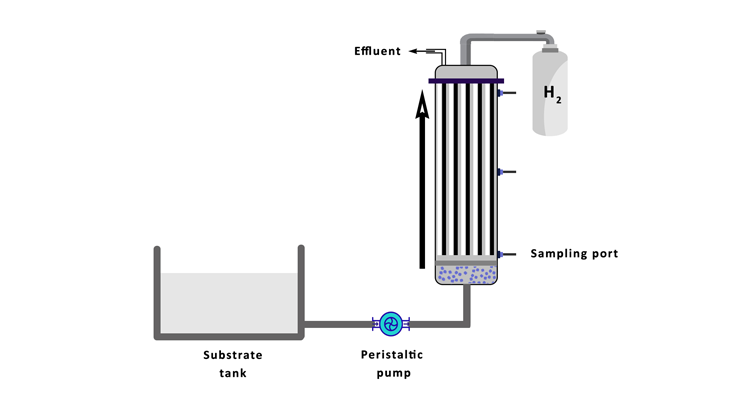 Dr Singh encapsulates that the technology and the model to be developed can be used to formulate new designs and processing parameters for producing H2 from other types of feedstocks and/or using engineered microbes developed by other researchers, which could solve the fuel problem for modern society. This work has been done in collaboration with Prof. Hong Liu from Oregon State University (OSU), USA.
Dr Singh encapsulates that the technology and the model to be developed can be used to formulate new designs and processing parameters for producing H2 from other types of feedstocks and/or using engineered microbes developed by other researchers, which could solve the fuel problem for modern society. This work has been done in collaboration with Prof. Hong Liu from Oregon State University (OSU), USA.
Dr Singh is an Editorial Board member of the Journal of Biomass Conversion and Biorefinery – Springer (I.F. 2.60) and a Guest Editor for Bioresource Technology Reports- Elsevier. His future research targets to reduce the component costs and test the proposed design using real waste streams, as well as continue to increase the reactor volume.
Read the full paper here: https://doi.org/10.1016/j.biortech.2021.125030
- Published in ENVS News, News, Research News
Search for compact IEC systems traversing disciplines
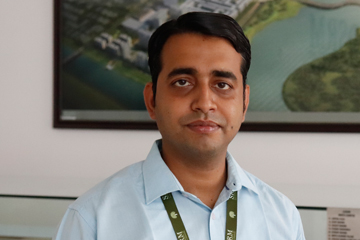 “Compact Inertial Electrostatic Confinement D-D Fusion Neutron Generator” is an imbuing research paper co-authored and published by Dr Somesh Vinayak Tewari, Assistant Professor in the Department of Electrical and Electronics Engineering (EEE), SRM University – AP, in the scientific journal, Annals of Nuclear Energy.
“Compact Inertial Electrostatic Confinement D-D Fusion Neutron Generator” is an imbuing research paper co-authored and published by Dr Somesh Vinayak Tewari, Assistant Professor in the Department of Electrical and Electronics Engineering (EEE), SRM University – AP, in the scientific journal, Annals of Nuclear Energy.
This paper is part of an interdisciplinary work leveraging the areas of both electrical engineering and physics. Inertial Electrostatic Confinement (IEC) Systems are simple, compact and operate on high voltage discharge in Deuterium- Deuterium (D-D)/ Deuterium-Tritium (D-T) gases between concentric grids for neutron generation. Such systems find considerable applications in the detection of explosives and illicit materials, radiography, tomography, and neutron well logging. The IEC system cathode temperature is measured with a Fibre Bragg Grating (FBG) during the measurement of neutrons from the system. FBG is optical fibre sensors that can be used for sensing temperature by recording the Bragg wavelength shift. The advantage of such measurements is that they can be used in environments such as electric arcs and plasmas, chemical and nuclear zones unaffected by electromagnetic fields such that the signals can be monitored remotely.
The production of neutron fluxes for the above-mentioned applications is through radioisotopes, accelerators, or nuclear reactors with the inherent nature of their complexity, hazards, and problem of residual radioactivity. Additionally, such systems require a considerable amount of shielding and Dr Tewari puts forth such factors that prompt further research in the area of the development of much simpler compact IEC systems.
The said research project has been carried out under the scheme of “Mentoring of Engineering Teacher by an INAE Fellow”, financially supported by the Indian National Academy of Engineering. The work goes forward in close collaboration with Pulsed Power & Electromagnetic Division, Beam Technology Development Group, Bhabha Atomic Research Centre (BARC)-Vishakhapatnam.
The future projects of Dr Tewari involve working on simulations related to the compact IEC for study, analysis, optimization of different parameters of an IEC system and related experimentation in collaboration with BARC.
- Published in EEE NEWS, News, Research News
Final year B.Sc. Biology student secures admission in University of Paris-Saclay, France
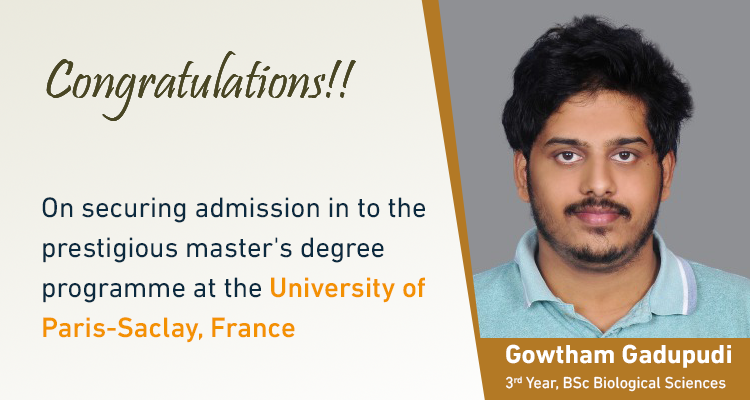 Student Interview: Gadupudi Gowtham
Student Interview: Gadupudi Gowtham
Q: Hi Gowtham, could you elaborate on the master’s program that you are being enrolled in?
A: Sure. M1 Life Sciences and Health – International Track – France, is a Master’s Program in the University of Paris-Saclay, France. I am enrolled in this research-driven multidisciplinary Master’s Program of two semesters that will nurture my research interests and can help me develop individual research trajectories.
Q: Please explain how this course is multidisciplinary.
A: This Master’s program is divided into three parts. During the first part of the program, all students are required to study Core Courses that address key concepts and challenges in the following basic fields of Life Sciences and Health. In the second part of the program, students can choose among a wide range of Elective Courses according their academic and career development goals. The third part is Research training which includes 4-week laboratory rotation period + 8-week internship.
Q: Had you applied to any other University?
A: Along with this university, I have also applied for Master of Science, Molecular Biology and Evolution (MAMBE) at the Christian – Albrecht University of Kiel, Kiel, Germany, and some other universities. MAMBE is an international program, taught entirely in English, and it is based on the fruitful collaboration with the Max-Planck Institute for Evolutionary Biology in Plön. Together with further collaborations (with the Leibniz Science Campus EvoLUNG (Evolutionary Medicine of the Lung), and also the Collaborative Research Centre 1182, Origin and Function of Metaorganisms), it specifically combines the areas of evolution and molecular biology – a combination which has emerged as an extremely successful interdisciplinary research field in recent years but has not yet been available in academic education.
Q: Can you talk about the Universities where you have applied in some detail?
A: In France, the University of Paris Saclay is a collaboration from all the respected universities with more than 300 laboratories with funding from the French government. And Kiel has emerged as a hotspot for Evolutionary Research in Germany. This includes several research groups with a focus on evolutionary topics at Kiel University (CAU).
Q: What are the scholarships that you have applied for?
A: Currently, at Paris- Saclay I haven’t applied for any scholarship yet but it has an Idex Scholarship for those who enroll in the Master’s Program.
In the MAMBE program, I have applied for the DAAD short-term scholarships and Promo’s scholarship for doing my Master’s thesis. Also, MAMBE has HiWi jobs as a research assistant at the desired lab. As a student affiliated to the Royal Society of Biology, I can also utilize the grants for my travel and Research Projects every year.
Q: How was your preparation for applications?
A: When I applied to the University of Paris Saclay, I applied through their University Portal. After verifications, I received an invitation for the Interview. On the day of the interview, I was asked about my current research project at SRM-AP, my motivation to study, and my future research goals and after 5 days I received an email stating that I was accepted.
I searched about German Universities through DAAD which is a database for education in Germany. After selecting the university, I had applied both online and through the post. Currently, it is being processed by the Uni- Assist where after meeting the requirements my application will be forwarded to the MAMBE admission team.
Q: Did you receive any support from SRM-AP and your department?
A: I can’t forget the support that I have received from SRM-AP University in providing me with the required attested documents and also giving necessary permissions during the pandemic. From the Department of Biological Sciences, the recommendation letters from Dr Jayaseelan Murugaiyan and Dr Manjunatha Thondamal supported my application to the universities that I have applied. The support and appreciation from everyone in the Biological Sciences Department has played an essential role in securing this admission.
- Published in Biology News, News, Students Achievements

